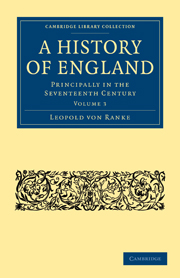Book contents
- Frontmatter
- Contents
- BOOK XI THE COMMONWEALTH IN ENGLAND, 1649—1653
- BOOK XII THE PROTECTORATE OF OLIVER CROMWELL, 1653–1658
- BOOK XIII FALL OF THE PROTECTORATE AND THE COMMONWEALTH. RESTORATION OF THE MONARCHY, 1658—1660
- BOOK XIV THE FIRST FIVE YEARS UNDER CHARLES II. THE RESTORATION OF THE ANGLICAN CHURCH
- BOOK XV THE DUTCH WARS OF CHARLES II. ESTABLISHMENT OF THE PROTESTANT AND PARLIAMENTARY CHARACTER OF THE CONSTITUTION 1664—1674
- INTRODUCTION
- CHAP. I The first war with Holland, in the year 1665
- CHAP. II Influence of France upon the continuation of war and upon the peace
- CHAP. III Fall of the Lord Chancellor Clarendon
- CHAP. IV Convention at the Hague in January 1668. Triple Alliance
- CHAP. V Government and Parliament in the year 1668
- CHAP. VI Secret alliance with France, 1669, 1670
- CHAP. VII Parliamentary sessions from, 1669 to 1671
- CHAP. VIII The second war against Holland, 1672
- CHAP. IX Origin of the Test Act
- CHAP. X Peace with Holland
- CHAP. XI Union of Parliament with the Prince of Orange
CHAP. V - Government and Parliament in the year 1668
Published online by Cambridge University Press: 07 June 2011
- Frontmatter
- Contents
- BOOK XI THE COMMONWEALTH IN ENGLAND, 1649—1653
- BOOK XII THE PROTECTORATE OF OLIVER CROMWELL, 1653–1658
- BOOK XIII FALL OF THE PROTECTORATE AND THE COMMONWEALTH. RESTORATION OF THE MONARCHY, 1658—1660
- BOOK XIV THE FIRST FIVE YEARS UNDER CHARLES II. THE RESTORATION OF THE ANGLICAN CHURCH
- BOOK XV THE DUTCH WARS OF CHARLES II. ESTABLISHMENT OF THE PROTESTANT AND PARLIAMENTARY CHARACTER OF THE CONSTITUTION 1664—1674
- INTRODUCTION
- CHAP. I The first war with Holland, in the year 1665
- CHAP. II Influence of France upon the continuation of war and upon the peace
- CHAP. III Fall of the Lord Chancellor Clarendon
- CHAP. IV Convention at the Hague in January 1668. Triple Alliance
- CHAP. V Government and Parliament in the year 1668
- CHAP. VI Secret alliance with France, 1669, 1670
- CHAP. VII Parliamentary sessions from, 1669 to 1671
- CHAP. VIII The second war against Holland, 1672
- CHAP. IX Origin of the Test Act
- CHAP. X Peace with Holland
- CHAP. XI Union of Parliament with the Prince of Orange
Summary
It was not exactly these considerations which determined the decisions of Charles II. The temper of Parliament may have had a certain influence upon them, but this must not be rated too highly. In spite of the antipathy of Parliament to France, Charles II would have concluded a new alliance with that power, if it would have agreed to his proposals. His decisions, which were of an entirely independent character, sprang especially from his wounded self-conceit, and his wish to separate France and Holland.
Although at the time of the fall and impeachment of the Chancellor he had allowed Parliament free action, and had given way to it, yet he had not intended, in so doing, to recognise the subordination of his ministers to Parliament, or generally to make his administration dependent upon parliamentary opinion: on the contrary, his new ministers cared even less for Parliament than the Chancellor had done; under their influence the King returned to the plans which he seemed already to have given up.
It is characteristic of the time and of the King, that a man like the Duke of Buckingham, George Villiers, son of the favourite of James I and Charles I, should have had a decided influence over the state: for no one seemed to be less born for business. He neglected the meetings of the Privy Council if any pleasure called him away; for days he could not be found, and when he again appeared, he had meanwhile changed his opinion.
- Type
- Chapter
- Information
- A History of EnglandPrincipally in the Seventeenth Century, pp. 479 - 490Publisher: Cambridge University PressPrint publication year: 2010First published in: 1875

